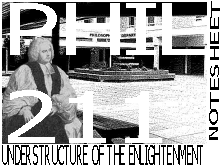 Locke 2
Locke 2 Locke 2
Locke 2Locke argues against the possibility of some ideas being 'innate'.
Ideas come rather either from sense or from reflection
There are just two ways in which an idea may be acquired: through one or other (or several) of the senses, and through 'introspection' - the mind looking at its own operations.
Against Locke, it had been argued that e.g. the following represented counterexamples:
"Whatever is, is."
"It is impossible for the same thing to be and not to be."
Sometimes the ideas which we get directly from sense or from reflection compound with each other. We then get complex ideas.
Pointer forward to the Romantics, rejecting 18th Century Enlightenment thinking, and Kant.
'Inside a person is a mind, and inside the mind, 'seeing' the ideas and operating upon them, is - a smaller person.' - is this a caricature?
Reason according to Locke operates on ideas, and in two ways, reflecting the distinction he makes between knowledge and opinion.
(a) If the links between any two ideas in a chain amount to one idea 'agreeing
with' another, you have demonstration.
(b)reason tells us what degree of probability attaches to a step in a proof.
"For as reason perceives the necessary and indubitable connexion of all the ideas or proofs one to another, in each step of any demonstration that produces knowledge: so it likewise perceives the probable connexion of all the ideas or proofs one to another, in every step of a discourse to which it will think assent due.' (See Essay, Bk IV, Ch. XVII, Section 2.)
An empiricist believes that all our knowledge comes from our experience of the world. A rationalist believes there is a source of knowledge, on some matters at least, that is over and above experience.
VP